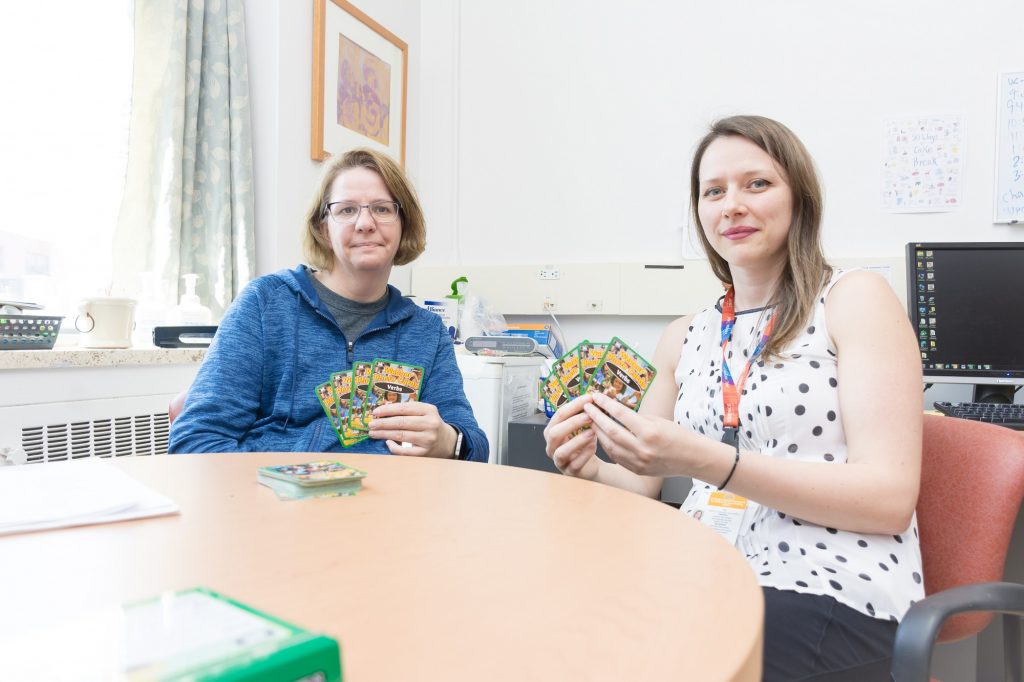Speech Language Pathologists help Tammy find her voice

May is Speech and Hearing Month
By Ramon Syyap
Speech Language Pathologists (SLPs) play an important role at Providence Healthcare and across our network. Their role is to assess, treat and manage the unique communication and swallowing needs of patients, which can vary from one individual to the next.
In order to determine these needs, SLPs work closely with individuals and their families to get to know who they are and develop goals that are meaningful to them. This may include helping patients find the right words to say or providing their caregivers with strategies to better engage them in conversation. It may also include determining appropriate diets to ensure that an individual can safely swallow when eating. In all cases, SLPs represent a major driver towards a patient’s road to recovery.
“We often take the ability to eat and talk for granted,” said Stroke and Neuro Rehabilitation SLP Leona Chan. “When those abilities are impacted, it can be socially isolating. It’s rewarding to see them regain their self-esteem and become more socially engaged with their care team, other patients and with their family and friends.”

In December of 2017, Leona began working with Tammy, a patient admitted to Providence’s Stroke and Neuro Rehabilitation program. Tammy had a stroke and as a result, acquired aphasia – a condition affecting her speech and ability to read and write.
“It may be the first time someone truly learns about their swallowing and communication impairments, so providing education, instilling hope, and equipping them with tools to communicate their basic needs and wants is important,” explained Leona of the importance of SLP rehab at Providence.
She added that, “For someone like Tammy, communication therapy may involve structured exercises to lay the foundation for improving her speech, language, or cognitive-communication, but also functional tasks to make therapy motivating and ultimately, meaningful.”
Since last winter, Tammy has made great strides that have seen her return home as well as transition to Providence’s outpatient Stroke Clinic where she began treatment with SLP Tina Simic.
“Re-adjusting to living at home again after an extended hospital stay can be very difficult. It can highlight how much their lives have changed since having a stroke. We try to make this transition back to the home as smooth as possible by addressing functional goals like training patients to make telephone calls, respond to work-related emails, or to place an order for their favourite drink at Tim Hortons,” described Tina, referring to therapy during the outpatient stage.
“We build upon the foundation laid by our inpatient therapists and work in conjunction with a team of professionals to provide treatment tailored to Tammy,” she added.

Part of Tammy’s therapy included exercising language through writing. In the following letter, Tammy expressed her gratitude and revealed a profound narrative for her journey:
“My name is Tammy and I am a mother of two boys, 16 and 14.
My occupation is bookkeeping for a glass manufacturing company.
I had a stroke on December 8, 2017. The consequences were weakness in my right side and aphasia.
I was a patient of Providence Healthcare, and currently I am an outpatient in the stroke clinic.
I am receiving physiotherapy, occupational therapy and speech therapy.
Therapy has taught me to work hard and to stay positive.
In the beginning, I had trouble with speech, reading and writing. The speech therapists were Leona and Tina – they were great. Now I am better in all these areas because of the hard work from the therapists. Also doing the homework helped me get better because practice makes perfect.
To all staff: your energy and patience, and hard work was very greatly appreciated.
To other stroke patients, I would say, time makes things better. And recovery is hard work.”
Through expert therapy and compassionate care, SLPs across our network like Tina and Leona are working diligently to help patients realize their voice and rediscover their independence.
“They are much more than their stroke. They have autonomy and come with a past, a present and most importantly, a future,” Tina emphasized.
